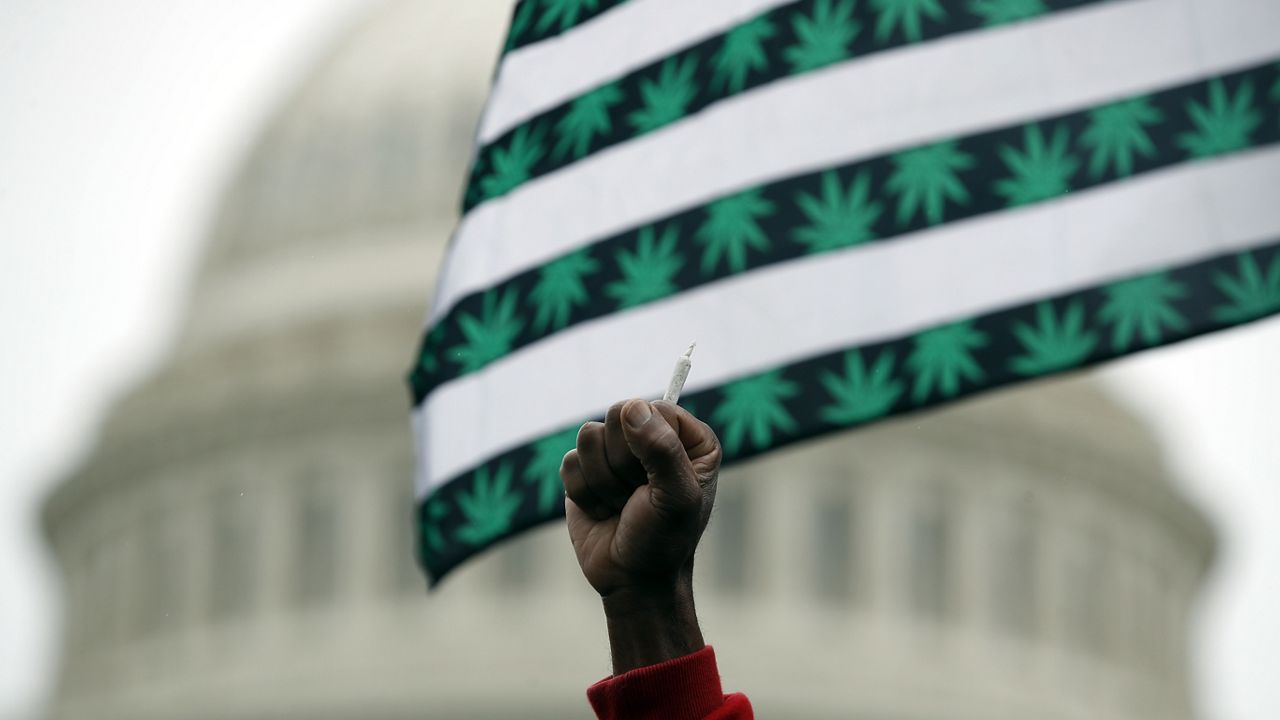In the wake of reports Tuesday that the Biden administration plans to reschedule marijuana as a lower-risk substance, a trio of Democrats in the Senate reintroduced a bill to legalize cannabis, saying they hope the action from the Drug Enforcement Agency will serve as a “kick in the pants” for reform.
Speaking to reporters on Wednesday, Oregon Sen. Ron Wyden and New Jersey Sen. Cory Booker — with the backing of Senate Majority Leader Chuck Schumer, D-N.Y. — reintroduced the Cannabis Administration and Opportunity Act, a measure that would decriminalize cannabis, remove it from scheduling under the Controlled Substances Act and provide a federal regulatory framework for the commercial sale of marijuana.
The bill would also expunge the criminal records of Americans with low-level cannabis convictions.
“Over the decades, millions of Americans, most often Americans of color, have had their lives derailed and destroyed by our country’s ‘War on Drugs,’” Schumer said, noting that its effects “linger on to this day.”
“It will help our country close the book once and for all on the awful and harmful and failed War on Drugs, which all too often has been nothing more than a war on Americans of color,” he later added.
"I feel a sense of urgency, because Black people are about 3.7 times more likely to have a marijuana conviction," Booker said, adding: "I go home to communities where there's been such a concentration of enforcement relative to the communities that a lot of us here in Congress have come from, including myself, that don't see that, that don't understand how economically devastating this is to a family."
"When you expunge records ... I've been to expungement hearings and have seen the tears on peoples' eyes, it's like economic shackles, anchors being released and they can breathe again and they can have freedom again," Booker said. "That's the urgency for millions of Americans who have been affected by enforcement of marijuana laws."
"A lot of folks in this country still remember the era of 'Reefer Madness,'" Wyden said, referencing the 1936 anti-cannabis film. "What I believe is being done now, seeing the way the Biden administration and the president, to his credit, has wrestled with this issue personally, this is now moving that era ... finally being sidelined, pushed to the side, we are relating to the 21st century."
The trio previously introduced the bill in 2022. It did not receive a vote in either chamber of Congress at the time. But this time around, lawmakers touted that the measure has a record high 18 sponsors — a far cry from the 60 votes needed to overcome the filibuster, but much greater than the five backers the bill had the last time around, including Booker, Schumer and Wyden.
“That’s a clear sign we’ve got momentum at our side and the wind is at our back,” the New York Democrat said.
The three lawmakers hailed Tuesday’s reports that the DEA was reportedly going to reclassify cannabis as a lower-risk drug, moving it from Schedule I — on the level with heroin, LSD and ecstasy — to Schedule III — the same level as ketamine, anabolic steroids and products with less than 90 milligrams of codeine per dosage unit, such as acetaminophen with codeine. But they acknowledged that’s not enough, and Congress must take further action.
“I want to disabuse people of the notion that because the White House moved yesterday, things are going to be at a standstill here in the United States Congress,” Wyden, who chairs the powerful Senate Finance Committee, said. “I look at this as a chance to get new momentum for our bill, for action on Capitol Hill.”
Schumer called the prospective action to reschedule cannabis “a truly historic step” and “long overdue,” but “it is not the end of the story, it is not all we need to do.”
“It’s time for Congress to wake up to the times and do its part,” Schumer said. “It’s past time for Congress to catch up to public opinion and to catch up with the science.”
According to a Gallup survey from last year, seven in ten Americans think marijuana use should be legal, a record high; support for legalizing cannabis sat at 68% for three straight years from 2020-2022, per the poll. Support has exploded in recent years, from 12% when Gallup first started asking the question in 1969 to first getting majority support (58%) in 2013.








